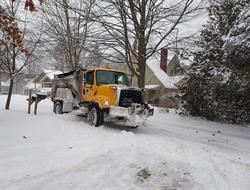Severe winter weather poses health and safety concerns with extremely cold temperatures, dangerous travel conditions, freezing pipes, potential propane shortages and power outages. As the State of Michigan observes Winter Hazards Awareness Week, Nov. 5–11, the City of Ann Arbor is sharing important information regarding emergency alerts as well as ways to prepare for what winter may bring from the Michigan State Police MIREADY program.
- Sign up now for emergency alerts from the City of Ann Arbor, via Everbridge, to be notified in the event of a weather-related or any other emergency.
- Washtenaw County residents should be aware of the winter-weather condition categories as set by Washtenaw County, and the accompanying actions necessary.
- Red: Extremely hazardous driving conditions exist on major highways and roads with heavy snow and/or ice, severe drifting and/or extremely limited visibility. Motorists are urged not to drive.
- Yellow: Very hazardous driving conditions exist with heavy snow, ice, drifting or limited visibility. Motorists are urged if they must drive, use extreme care, and allow for significant drive time.
- Warning: Hazardous weather has arrived and poses a threat to life or property. Take protective action.
- Advisory: Hazardous weather is imminent or likely.
- Watch: The risk of hazardous weather has increased but occurrence, location or timing is uncertain.
- Residents should have an emergency plan in place to know, in advance, where they can find temporary shelter in the event of power outages during extreme temperatures.
- Visit www.ready.gov/plan to learn how to build an emergency plan for your household.
- In certain instances, Washtenaw County partners with community agencies to open emergency, short-term shelters. As part of your preparations, be sure to refer to the county website, for daytime and overnight warming center information.
- Prepare your home for winter:
- Weatherproof your home by installing weather stripping, caulking and insulating walls, doors and windows.
- Insulate any water lines that run along exterior walls, so pipes are less likely to freeze.
- Lock in a propane rate now and have a backup heating plan, such as a generator, wood stove or fireplace.
- Have gas or oil furnaces inspected by a qualified professional and change the air filter.
- Have your fireplace and chimney cleaned and inspected. Contact your local fire department for a referral or look for a local inspector online.
- Install battery-operated carbon monoxide (CO) detectors near every sleeping area. CO poisoning is most prevalent when furnaces are turned on to fight cold winter temperatures, but commonly occurs after winter storms and accompanying power outages, when people tend to rely on portable generators for electricity.
- Clean gutters to prevent ice dams from forming. Roof ice dams can cause water to build up, leading to interior damage.
- Clear storm drains along the curb to enable water to drain. If plugged, water has the potential to go into low-lying areas and flood basements.
- Have an emergency preparedness kit stored safely in your house that includes water, non-perishable food, a first aid kit, extra batteries, a battery or hand-crank powered radio, emergency lighting or flashlights, extra blankets, and warm clothing.
- Prepare your vehicle for winter:
- Have your radiator system serviced before winter and make sure to replace windshield wipers and wiper fluid with a wintertime mixture that will not freeze.
- Replace any worn tires and check air pressure regularly.
- Have your brakes, brake fluid, oil, car battery, heater and exhaust checked to make sure everything is running efficiently.
- Keep an emergency preparedness kit in your vehicle stocked with batteries, battery-powered or hand-crank radio, flashlight, windshield scraper, jumper cables, mobile phone charger, shovel, blankets, first aid kit, non-perishable food, and bottled water in the event you get stranded or stuck. Visit www.ready.gov/kit to learn how to build an emergency kit for you and your family.
For more information and resources on how to prepare before, during and after an emergency or disaster, visit www.michigan.gov/miready.











